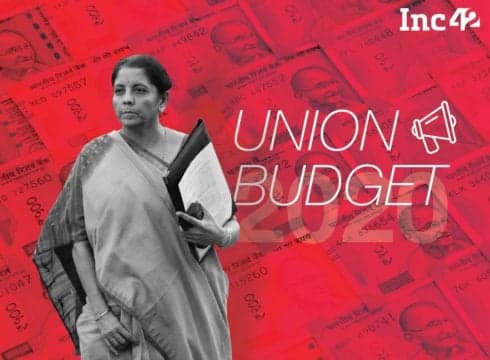Budget 2020 may likely lower the tax rates for middle-income taxpayers
Govt should restore exemptions of the long-term capital gain tax on the listed equity shares
Tax incentives to incubators under AIF, reduction in GST rates on AIF management fees can be given
Inc42 Daily Brief
Stay Ahead With Daily News & Analysis on India’s Tech & Startup Economy
The run-up to the budget has always been full of expectation and excitement. But this time around, the Budget 2020 has grabbed a lot more attention. This is because of the slowdown in the economy and the measures, people are hoping, the government will take to improve the situation. Ahead of Budget 2020, industry stakeholders are looking forward to some tax reforms and relief, and measures to counter the economic slowdown.
Here is the list of expectations from Union Budget 2020 that the individuals and businesses are looking forward to.
Reforms In Income Tax Slabs
Budget 2020 may likely lower the tax rates and bring other reforms for middle-income taxpayers. Currently, there is no tax for those earning up to INR 5 Lakh. Taxpayers earning between INR 5 lakh and INR 10 lakh are taxed at 20% and those above INR 10 lakh are taxed at 30%.
This Budget may announce changes in the tax rate for income earners of up to Rs 10 lakh. There are talks about increasing the basic exemption limit to INR 3 lakh, which would lead to lower tax collections across all taxpayers. If a tax cut is in the works, the government will have to take measures in the upcoming fiscal to compensate for it, since tax collections on both direct tax and indirect tax side have been sub-par.
Tax Benefits Under NPS To Be Doubled
The Pension Fund Regulatory and Development Authority of India (PFRDA) has pitched to the finance ministry to raise the tax deduction benefit under the NPS to Rs 1 lakh. At present, the tax deduction limit under NPS is INR 50K. It has also urged the government to extend the tax-free employer’s contribution benefit of 14% to all the NPS subscribers. This facility was made tax-free for the central government employees from the April 1, 2019.
Apart from these tax reforms, the PFRDA has requested the ministry to increase the age limit for subscription under Atal Pension Yojana (APY) from 40 years to 60 years and pension limit from INR 5,000 per month to INR 10,000 per month.
No Tax On LTCG
Equity brokers have requested the government to restore exemptions of the long-term capital gain tax on the listed equity shares. Before the Union Budget 2018, no tax was levied on the LTCG earned from such equity investment.
Finance Act 2018 reintroduced tax on LTCG arising from the transfer of equity shares of a company, units of equity-oriented funds and units of business trust. A concessional rate of 10% was announced on LTCG exceeding Rs 1 lakh. Further, all gains arising from such specified assets up to the 31st of January 2018 were grandfathered.
The re-introduction of this exemption will increase investments into equity among the investors that might help pick up the falling economy.
Reduction In STT And CTT Rate
Equity and commodities brokers have sought the reduction of the Securities Transaction Tax (STT) and the Commodity Transaction Tax (CTT) in the forthcoming budget. They have requested to reintroduce the rebate under section 88E of the Income Tax Act for the STT and CTT paid. Also, the reduction in STT rate is a much-needed relief to tackle the increased transaction cost.
Tax Incentives For Startups
The government is expected to take several measures in the upcoming budget to support the growth of start-ups in India. The measures might be on the recommendations of the Department of Promotion of Industry and Internal Trade (DPIIT). The suggestions include the extension of tax incentives to incubators under Atal Innovation Mission, reduction in GST rates on AIF management fees, and tax benefits of ESOPs. ESOPs are the best way to attract a highly-skilled workforce as giving a high payout might cause a cash crunch to startups. Reducing the tax on ESOPs will help the start-ups to attract a talented workforce. These initiatives will help to boost the economy of the country in the coming fiscal.
Streamline DDT For Corporates
There are chances that the government might relook the policy for dividend taxation in the hands of an investor/shareholder. Currently, dividends are taxed at the distribution level in the hands of the corporate at a rate of 20.56%. However, the distributed dividends are tax-free in the hands of the investors, provided the amount of dividend received is less than Rs 10 lakh.
Additionally, the profits out of which the dividends are paid are subject to a corporate tax at 30%. This leads to triple taxation of the same income from corporates for the ultimate recipient i.e taxpayers. Dividends are rewards to shareholders out of the taxable profits of a company. Taxpayers must be encouraged to make equity investments and participate in the capital formation of a company. There is a need to streamline the tax on dividends distributed by corporates.
{{#name}}{{name}}{{/name}}{{^name}}-{{/name}}
{{#description}}{{description}}...{{/description}}{{^description}}-{{/description}}
Note: We at Inc42 take our ethics very seriously. More information about it can be found here.


